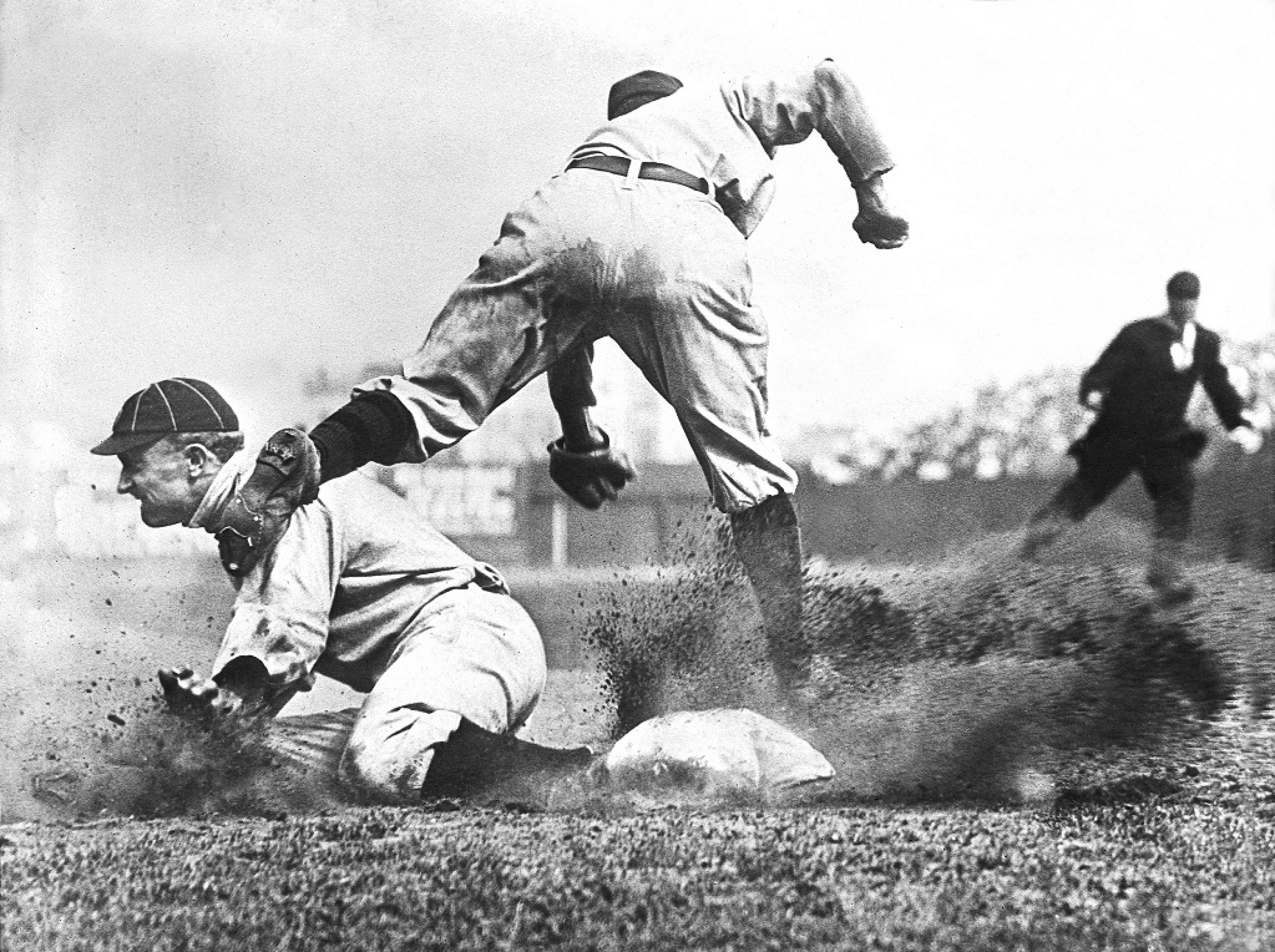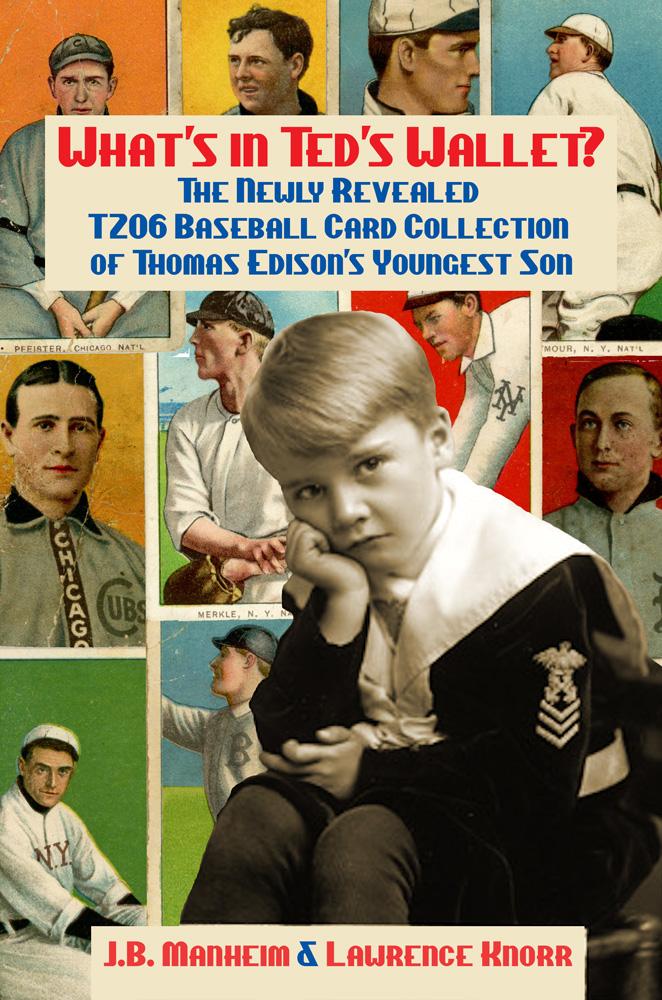Baseball History Comes Alive Now Ranked #2 by Feedspot Among All Internet Baseball History Websites and Blogs!
Guest Submissions from Our Readers Always Welcome!
Scroll Down to Read Today’s Essay
Subscribe to Baseball History Comes Alive for automatic updates. As a Free Bonus, you’ll get instant access to my Special Report: Gary’s Handy Dandy World Series Reference Guide!
Book Review:
What’s in Ted’s Wallet? The Newly Revealed T206 Baseball Card Collection of Thomas Edison’s Youngest Son
by J.B. Manheim and Lawrence Knorr
reviewed by Gary Livacari
I don’t believe you can find a more ardent follower of baseball than myself, as a day seldom passes when I do not read the sporting pages of the newspapers. In this way, I keep close tab on the two major leagues and there was one time when I could name the players of every club in both leagues –Thomas Alva Edison (1)

Fans of the Deadball Era, along with those who have an active interest in vintage baseball card collections, will enjoy the new book, What’s in Ted’s Wallet? The Newly Revealed T206 Baseball Card Collection of Thomas Edison’s Youngest Son, by authors J.B. Manheim and Lawrence Knorr
J.B. Manheim is Professor Emeritus at George Washington University. Some of you will remember his earlier book, This Never Happened, the Mystery Behind the Death of Christy Mathewson, which I reviewed here last year.
Before they explore the details of this unusual collection, the authors provide ample evidence of Thomas Edison’s great love for baseball. He was a self-described “baseball fanatic,” as the above quote fully attests. One photo in the book, dating from 1912, depicts 65-year-old Edison on the mound pitching for his West Orange Edison Company baseball team during the annual Field Day events.
The Edison family spent winters in Fort Myers Florida, located close to Terry Park Ballfield, the spring training facility of the Philadelphia Athletics. Edison visited the park on at least two occasions — in 1926 and 1927 — and became friends with both Connie Mack and Ty Cobb, the latter having joined the team in 1927. Another photo depicts 80-year-old Edison at the plate swinging at a pitch thrown by Cobb with Mack as the catcher. After one of his visits, he invited the entire team to his nearby Seminole Lodge for lunch, where a group photo was taken.


Greatly influenced by his father, there’s no doubt from where Edison’s son acquired his interest in baseball. Theodore “Ted” Edison was born in 1898, the youngest of Edison’s six children and the third with his second wife, Mina. Theodore was named after an uncle who was killed just days before his birth as a member of Teddy Roosevelt’s Rough Riders during their famed charge up San Juan Hill. Thomas Edison was fifty-one years old when Ted was born.
Manheim and Knorr provide convincing circumstantial evidence that Ted started collecting cards in 1909 while his family spent the summer on Monhegan Island off of Maine. The specific reason he started the collection is unknown, possibly as a way to have a shared interest with his father or to earn more of his busy father’s attention. The actual collecting of the cards proved to be a short-term activity for Ted, as it had abruptly ended by 1911. However, Ted regarded the card collection with such personal importance that he held on to it for the next eighty years, virtually his entire life, carrying it around with him in a tattered old wallet. Both the wallet and the cards survive to this day.
An interesting question is how exactly Ted obtained the cards. They were only available as promotional items in nickel and dime packs of cigarettes produced by the American Tobacco Company. Thomas Edison, even though he admitted having an addiction to cigar smoking and chewing tobacco, had a known aversion to cigarettes. With support from his friend and fellow iconic American inventor, Henry Ford, he even became the face of a highly publicized feud between himself and Henry S. Percival, the president of the American Tobacco Company. According to Edison, an ingredient found in the cigarette paper called acrolein was the real culprit, not the tobacco itself. At one point he stated that acrolein was “making boys insane.” So adverse was Edison to cigarette smoking that he wouldn’t allow cigarettes to be smoked by the employees in his lab.
As a young boy in 1909 when his collecting hobby began, Ted could not have acquired the cigarette packs himself. So who helped him? Was it a family friend, or perhaps even a family member? Was the person risking the wrath of Thomas Edison in so doing? What were Thomas Edison’s feelings as his son collected baseball cards that could only be obtained by supporting cigarette smoking? Unfortunately, we can only speculate as to the answers.

As for the cards themselves, they showed varying degrees of wear and tear and evidence of repeated use. The 61 cards in the collection depict 58 players, with three duplicates. Although there were many obscure players that only devotees of the Deadball Era like me would recognize — names like Paddy Livingston, Red Ames, Heine Berger, Dave Brain, Kid Elberfeld and Howie Camnitz, among many others — young Ted displayed a keen eye for recognizing talent. Considering that the Hall of Fame didn’t open until 1939, there are no less than ten future Hall of Famers in the collection: Christy Mathewson, Chief Bender, Mordecai “Three Finger” Brown, Frank Chance, Ty Cobb, Hughie Jennings, Walter Johnson, Joe Kelley, and Vic Willis.
The authors also speculate that perhaps young Ted Edison attended the infamous September 23, 1908, “Merkle game,” in which Giants’ rookie Fred Merkle failed to touch second base after an apparent game-winning hit. The “boneheaded” play contributed to the Giants’ eventual loss of the 1908 pennant to the Cubs. Besides Fred Merkle, Ted kept cards of Moose McCormack, Jack Pfiester, and Frank Chance, all directly involved in the play. He had cards for Mike Donlin, Christy Mathewson, and Cy Seymour who all played in the game, along with the aforementioned “Three Finger” Brown, who won the eventual tiebreaker for the Cubs.

Ted Edison was the only one of his siblings to follow in his father’s footsteps, graduating from MIT in 1923 with a degree in physics. He eventually became an engineer for the Edison Company, rising to the level of Research Director. He remained an environmental activist most of his life. After Ted died in 1992, age 94, many personal items from the Edison family were donated to the National Park Service, including historical artifacts and documents, lab reports, and business records.
Found among the donated items – and of special interest to those of us who are students of baseball history – was Ted Edison’s tattered wallet containing 61 vintage T206 baseball cards dating from the Deadball Era years of 1909 and 1910. For this discovery, we are very grateful; as we are to J.B. Manheim and Lawrence Knorr for documenting the collection in their outstanding new book, What’s in Ted’s Wallet.
Gary Livacari
Subscribe to our website, Baseball History Comes Alive with over 1500 fully categorized baseball essays and photo galleries, now surpassing the one million hits mark with over 1,185,000 hits and over 950 subscribers: https://wp.me/P7a04E-2he
Information: Quote (1) from What’s in Ted’s Wallet? by J.B. Manheim and Lawrence Knorr


Great Gary, nobody beats your zeal in making this site the absolute best!
A blessed Memorial Day weekend to all!
Thanks Bill…same to you!
Ted came back and cleaned up my smart phone typo!
You channeled him, right?
Yes I did!
VERY interesting. Loved the photos of Edison with Mack & Cobb. Would have been great to have a photo of the cards, laid out flat surrounding the wallet.